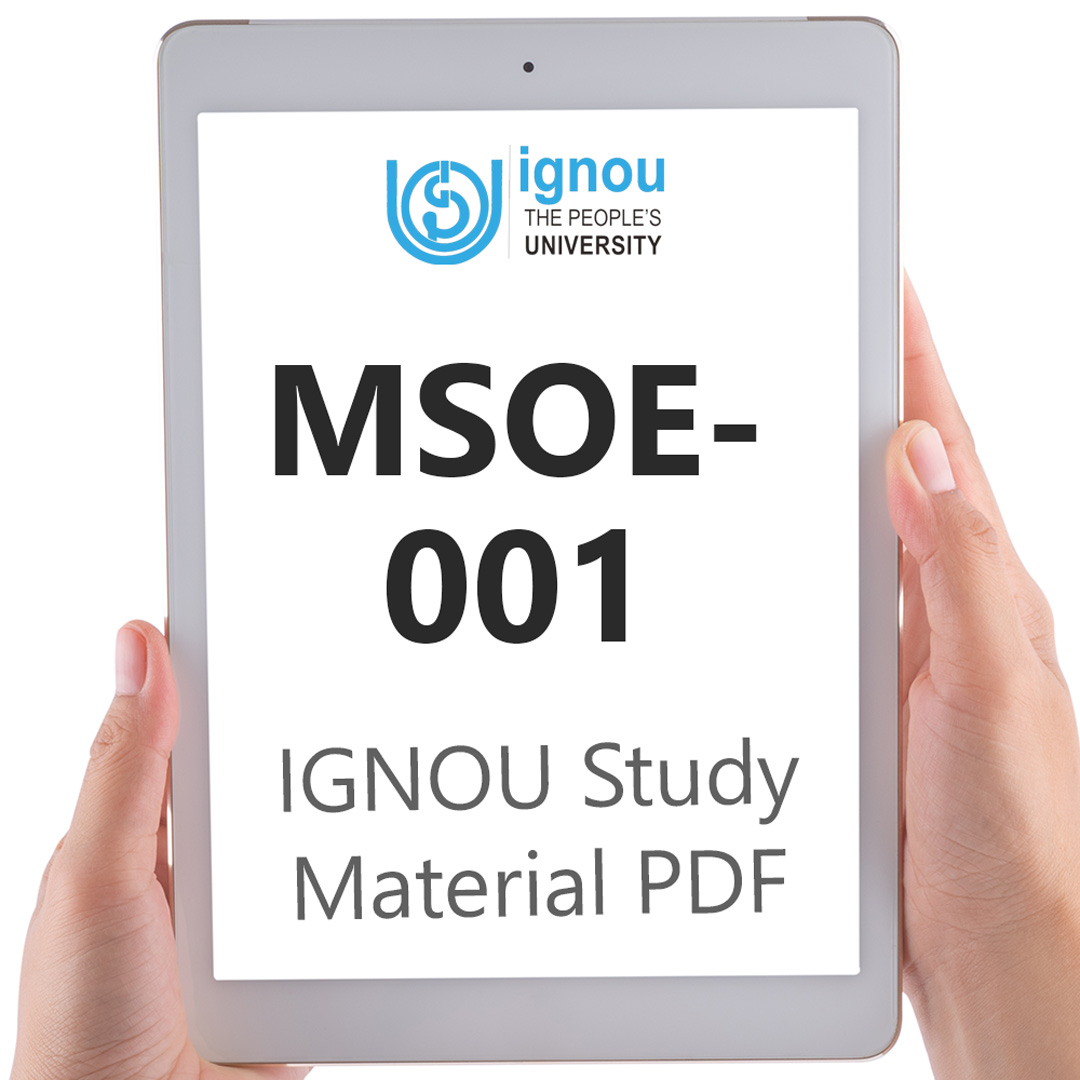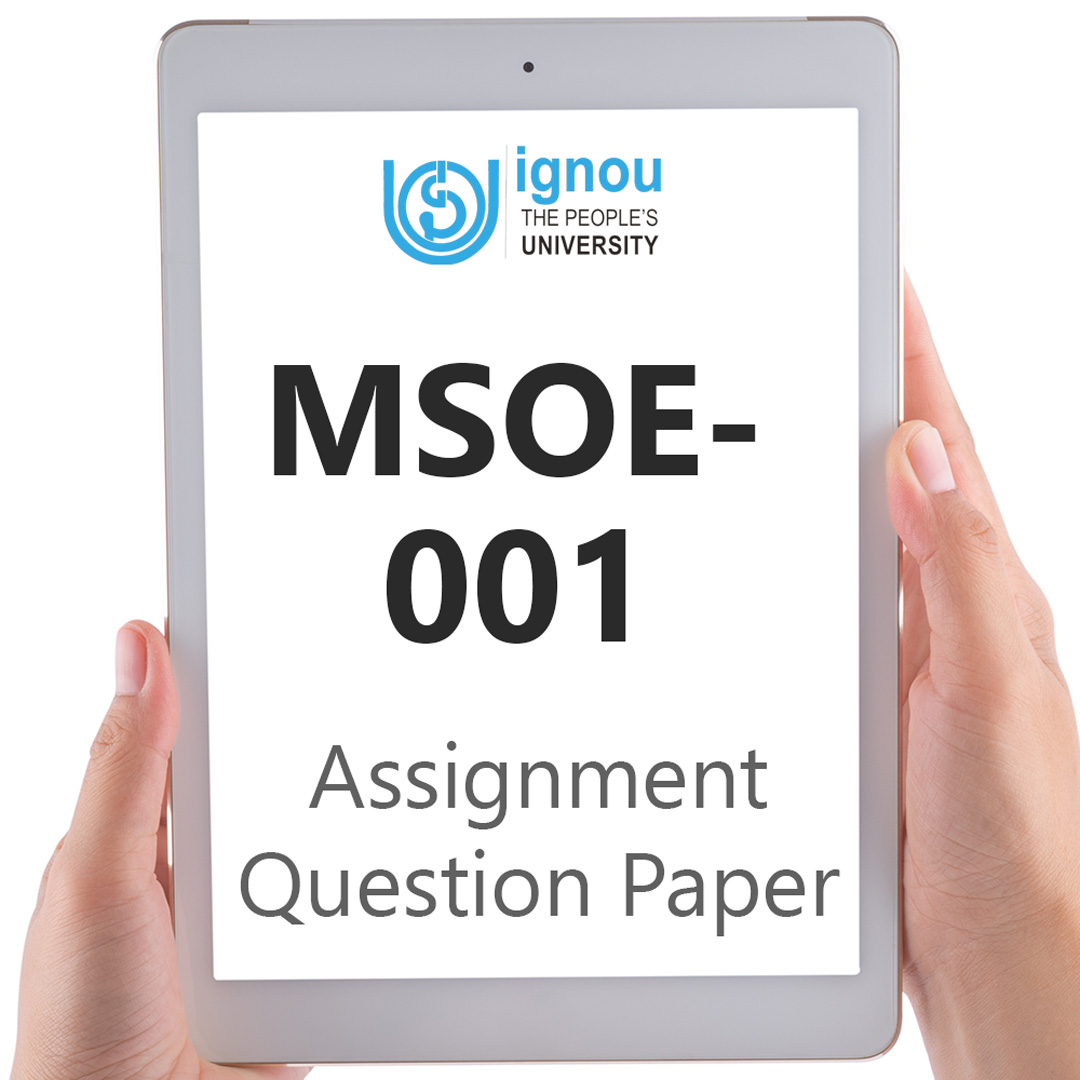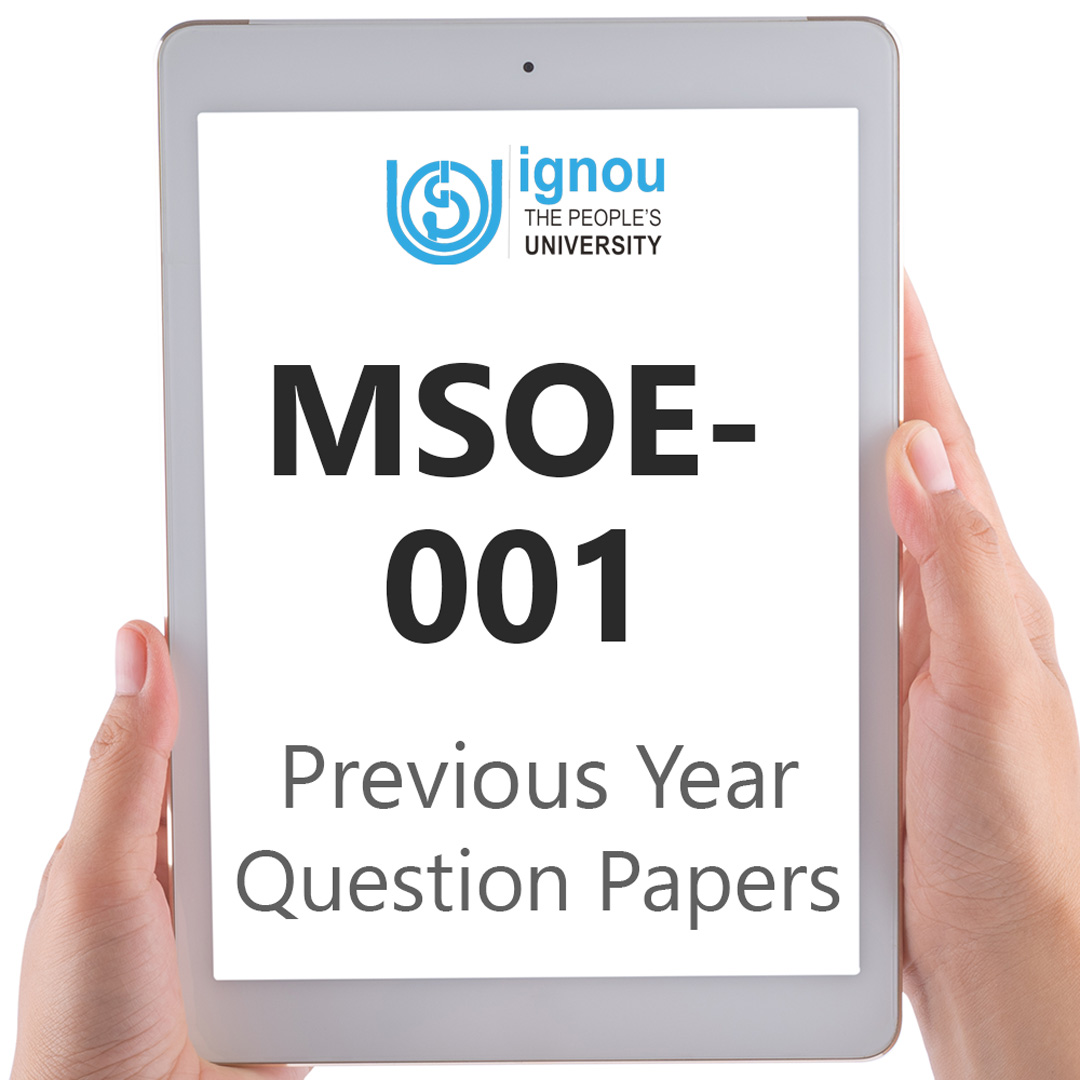If you are looking for MSOE-001 IGNOU Solved Assignment solution for the subject Sociology of Education, you have come to the right place. MSOE-001 solution on this page applies to 2022-23 session students studying in MSO courses of IGNOU.
MSOE-001 Solved Assignment Solution by Gyaniversity
Assignment Code: MSOE-001/AST/TMA/2022-2023
Course Code: MSOE-001
Assignment Name: Sociology of Education
Year: 2022-2023
Verification Status: Verified by Professor
Answer any five questions selecting at least two from each Section. Your answer should be in about 500 words each.
Section-I
Q1) Discuss the sociological perspective on education.
Ans) The sociological view of education places equal emphasis on the educational process and the interactions between education and many facets of society. Understanding how education affects social processes and is affected by them is of utmost importance. The ideas of Plato and others who emphasised the importance of education in establishing social order and bolstering the state established the groundwork for sociology of education. The French sociologist Emile Durkheim emphasises the necessity of studying education from a sociological perspective.
The requirement for educators in the United States of America and Canada to integrate the huge number of immigrants with the school and the community at large gave rise to what was previously known as educational sociology, according to Jayaram. The issue was complicated by the industrialization's complex needs. The main issues they had to deal with were how to integrate newcomers into the society effectively, what kind of education to provide for rural kids who were starting formal schooling for the first time, and how languages, ethnic identities, and religious connections affected learning patterns.
It was required to evaluate the social concerns with education and comprehend the relationship between social variables and education in order to address these issues. As a result of the interaction between sociologists and educationists, "educational sociology" came into being. The role of education in society, its place within it, and the interactions between schools and the community are all part of the definition of educational sociology's purview. As educationalists and sociologists' interests waned over time, educational sociology was superseded by what is currently known as "sociology of education."
The significance of the social and cultural framework of education is established by the sociological perspective on education. Dewey makes a distinction between an individual's growth in line with the goals of a particular society and their natural growth, whereas Durkheim focuses on the function of education in the preservation of society and culture. We must comprehend that the social order has designated certain aims, values, and abilities as essential, and that these are imparted through the educational process. These are now changing as the social order itself changes. Because of this, education is often described as a dynamic process.
Sociologically, the aspects of education that are most salient in society are those that have to do with its contribution to bringing about social change and its function in upholding social order, social control, and power structures. A significant portion of these are influenced by education, which takes into account the manner in which teachers and students interact, the type and content of the lessons, the depth of the learning, and other factors. The matrix of the school and community is another factor.
The most important challenges facing sociologists today are the politics of educational curricula, modes of instruction, and the function of schools in society. It's interesting to note that sociologists are re-evaluating the place of schools in society. In reality, sociologists are challenging the fundamental tenet that only education can result in social and human growth.
Q2) Compare functionalist and conflict approaches towards the understanding of education.
Ans) Every society has a built-in system for educating the individual and passing down its culture to the next generation. Education for the young gets more differentiated, sophisticated, and intertwined with other facets of society as a basic culture develops into an industrialised and contemporary state. By creating a formal educational system, the demands of the learning process are met. This technique helps the kids become accustomed to the impersonal and diverse interactions found in greater society after leaving the constrained and concentrated relationships of the home.
Functionalism
Functionalism views society as a set of interconnected, formally organised social structures with observable patterns. According to functionalists, society is made up of numerous unique but interrelated pieces, each of which contributes to the survival or functioning of the entire system. Not only are all the components interrelated, but they are also coordinated and mutually beneficial. A change in one part is thought to affect other parts, and when one-part malfunctions, other parts respond to it in a coordinated manner to keep the balance of the entire system.
Abrupt alterations to the entire system are not valued by functionalists. They place focus on the lack of internal disturbances that might undermine the system's overall stability. Different parts or units of the community function in accordance with shared opinions, attitudes, ideals, and beliefs. This understanding or consensus is attained through the socialisation of individuals through the society's guiding ideas. The family is the main socialisational force in basic or traditional civilizations. Socialization is frequently handled by educational institutions separate from families in modern or industrialised nations.
Conflict Theory
In terms of fundamental methodology, conflict theorists stand out in stark contrast to functionalists. Conflict theorists contend that despite society's ongoing unrest, it is kept together by strong social groups that compel cooperation from the weaker members. They view society as being composed of dominant and subservient factions that are constantly at odds with one another. It is not necessary for various entities to function in a way that upholds the solidarity of the entire society. Social instability is a real possibility that is about to materialise. The components of society are always evolving.
It is necessary to acknowledge this dynamism as a typical aspect of all societies. Conflict of some kind arises whenever two units interact, and conflict is necessary for society to continue. Conflict-causing factors can be found at all levels, from the individual to the national. Conflict can have a variety of effects on society, both positive and harmful, latent, and obvious, violent, and slow. Conflict theorists focus their studies on the interactions between two or more social units and have a tendency to be more precise.
The topic of what should be taught by Kumar offers a critique of the educational system. Although his study has a strong Indian context component, it offers a wealth of perspectives for a critical examination of the global educational system. He concurred that the type of knowledge taught in schools represents the broad classification of knowledge and power in society.
Q3) How does education perpetuate gender inequality in society? Discuss.
Ans) Education appears to ensure mobility, expand horizons, and make the future bright. Common sense views schools as democratic, liberal institutions dedicated to fostering social advancement. Assuming that the school curriculum delivers impartial knowledge would be false. An already unequal and stratified society is made more unequal by education. As we've already established, education is deeply ingrained in the larger web of social and political ties that govern it. The sociology of education examines how education interacts with the political, social, and cultural spheres of influence.
It exposes the power struggles and conflicts that arise in the educational sector. Apple and other companies contest the following fundamental notions about how education works: All students are taught technical curricular skills and information unequivocally so that they stand an equal chance of competing for financial rewards. The selection processes are neutral, schools actually place an emphasis on ability, and schools teach technical curricular skills to all students. They maintain that imparting the same abilities to everyone is not the larger goal of education. The social order that exists in society is perpetuated by educational procedures.
The use of power through education is a common practise. Education is a tool used by dominant social groups to maintain dominance. The deliberate depiction of the powerful in society is followed by the biased selection of knowledge, ensuring the subliminal control of the masses through the educational system. The fact that dominant groups have such control over education makes their dominance respectable and very hard to resist. This is what Kumar calls quiet, polite dynamic domination. Social hierarchies in society are now maintained by education. The dominant social groups in society maintain and extend their dominance by keeping their knowledge and expertise to themselves. Only a select few elite individuals gain the right to hold such extremely restricted knowledge. This becomes the principal strategy used by society's dominant factions to keep control.
According to Apple, some knowledge, particularly the most esteemed in schools, may be related to the reproduction of the economy. Whose information and which academic inquiry may be regarded as genuine is determined by the policing actions of the powerful. They regulate or filter knowledge before it is made accessible to the general public. When knowledge is eventually shared and accepted by the populace, it is accepted by the powerful and suits their objectives. The dominant social classes control what constitutes knowledge and how widely accessible it is.
Schools provide the notion that everyone is taught how to acquire specific technical information and skills. However, in practise, educational institutions merely ensure that a predetermined number of students are chosen for higher education levels, helping to maximise the technical knowledge required by the economy. Lower socioeconomic strata of society's members are poor, and they lack political and cultural rights.
Children from this group of people in society receive an entirely different type of education than those from the upper group. The curriculum and schools prioritise the interests of the privileged classes over those of the downtrodden. According to Apple's observations, schools instil various ideals and dispositions in their various student demographics. If the particular student body is composed of members of the professional and managerial classes, then the schools' and their curricula's main focuses should be on flexibility, choice, and inquiry, among other things.
Section-II
Q2) What is multicultural education? Discuss its relevance in contemporary society.
Ans) People from many economic, social, and cultural backgrounds converge in educational institutions. These differences, which specifically take the form of race, religion, and ethnicity in a society that is changing quickly, present challenges as well as opportunities for educators to develop curricula that integrate the micro-perspective of local communities with the broad educational orientation of the state and society. In this context, multicultural education is understood as an educational technique in which students from different cultural backgrounds are valued and crucial in creating the curriculum and learning environment in the classroom.
It is intended to strengthen and broaden the notions of culture, cultural plurality, and equality in the context of formal education. Cultural diversity is a prized resource in multi-cultural education. In essence, this education's orientation aims to help students understand that despite cultural differences, people from different backgrounds share many traits in common. We all have the capacity and desire to learn from one another's cultures, and through contact with other cultures, we develop respect for and tolerance of people from different cultural backgrounds.
A further component of multicultural education is democratic values. Christine Bennett asserts that multicultural education is a method of instructing and learning that is founded on democratic principles and aims to promote cultural pluralism in communities with varied cultures and in a globalised, interdependent society. He views cultural pluralism as the ideal state of society, one in which all current cultural groups are treated equally and with respect.
Members of ethnic groups are allowed to maintain their cultural practises as long as they comply with those norms deemed necessary for peaceful coexistence with the society as a whole. This is in contrast to the cultural assimilation or melting pot images where ethnic minorities are expected to give up their traditions and to blend in or be absorbed by the host society or dominant culture. According to him, multicultural education has four unique, perhaps overlapping, characteristics. It is a movement, a course of study, a method, and a dedication. Let's get into further detail about these.
It is a movement to create equity and equitable educational opportunity for all groups, regardless of their racial, social, gender, economic, or other backgrounds. Therefore, its goal is to alter the entire learning environment.
The educational system creates a curriculum that is essentially integrated and multicultural. This curriculum-based approach to multicultural education fosters awareness and comprehension of cultural variances, the history of all ethnic groups in the countries, as well as their contributions to earlier civilizations. Along with monoethnic perspectives, it also tries to incorporate global and multi-ethnic ones.
People become more cosmopolitan in their perception, assessment, conviction, and behaviour over time without denying their own cultural values and identities.
It is a determination to fight racism and other forms of discrimination by acquiring the necessary knowledge and abilities.
In democracies, the idea of a diversified society has long been respected. It is now understood that multicultural education is crucial in the globalised world for academic achievement and equity, the existence of multi-ethnic societies, the existence of an interdependent globe, the promotion of equity and democratic principles, and many other factors.
Q2) “Education is a tool for women’s empowerment”. Discuss.
Ans) Worldwide, women make up about half of the population. However, because they were denied equal opportunity in various places of the world, the hegemonic male ideology caused them a great deal of suffering. One of the most pressing concerns of these movements for women's rights has been access to education. India's government and civil society have focused a lot of attention on women's education since well-educated women can contribute significantly to the country's development.
Because it gives women the confidence to take on difficulties, question their old roles, and transform their lives, education is viewed as a crucial step towards the empowerment of women. Women's education is the most effective instrument for changing their status in society. The majority of women in our nation are still illiterate, outdated, frail, and exploited. Additionally, education helps to lessen inequality and raises the status of students within their families.
Women have access to empowerment and capacity building as a means of obtaining useful knowledge and skills for bettering their lives. Only if women contribute to the best of their talent and aptitude, which is only achievable when they are educated and empowered, will India become a developed country. Women's empowerment is a relatively new idea. The year 2001, the first of the New Millennium, was designated as "Women Empowerment Year."
Women who are educated have better families, which in turn create an ideal community and a developed country. A progressive nation is one in which all citizens, regardless of gender, religion, caste, faith, or race, enjoy complete economic, social, cultural, and political independence. Recent UNESCO data demonstrate how education changes development. It reads:
Girls and young women who have received an education are more likely to be aware of their rights and to feel empowered to assert them.
Education aids in the understanding of democracy, encourages the tolerance and trust that support it, and inspires individuals to get involved in their countries' political systems.
Economic growth would be boosted by productivity improvements if all children had equal access to school, which would expand job options.
The solution to environmental issues is education. Education increases the likelihood that a person will recycle household waste and use water and energy resources more wisely.
Educating women helps prevent child marriage by if more women have access to education.
Many women still perish in various nations from issues related to pregnancy and childbirth. These deaths can be avoided with education.
Some paediatric illnesses can be avoided, but not without education. Some of the deadliest childhood ailments can be avoided with easy fixes like malaria nets and clean water, but only if moms are trained to use them.
Education enables women to spot early symptoms of sickness, get information, and take appropriate action. Child mortality in developing nations would decrease by a sixth if all mothers completed their primary education.
With the aid of knowledge, the catastrophic effects of starvation on children's life can be avoided.





